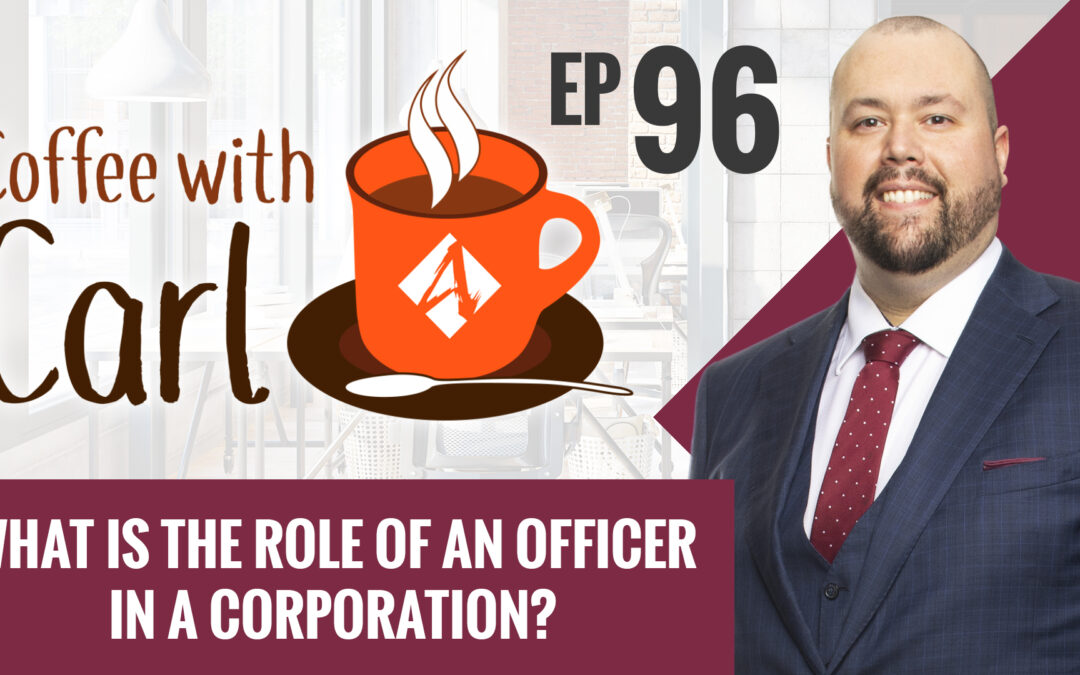What are the responsibilities of a Corporation’s Officer?
In this episode of Coffee with Carl, attorney Carl Zoellner explains an officer’s role within a corporation.
Welcome to another episode of “Coffee with Carl.” I am your host, Carl Zoellner. Today, I will talk briefly about the role of an officer in a corporation. I know we’ve talked in previous videos about a director’s role and the role of a shareholder.
Today, we will talk about the role of an officer. For those of you who don’t know, I’m one of the attorneys here with Anderson Business Advisors and we run tons of educational events.
This is my video blog, where I share common issues that come up. It may seem sort of elementary that these things come relating to a corporation. It may make a lot of sense when you’re sitting there and listening to it. However, when you get home, you’ve got to start running your business. And that’s when more questions pop up.
Therefore, let’s talk briefly about the role of an officer in a corporation. Going back to our hierarchy (in previous videos) I mentioned shareholders being the owner, and they elect directors. The directors dictate the global direction of the business. And then the directors hire officers who then execute that plan and carry out the director-level position’s orders.
The confusion usually comes in with these types of levels or these different types of positions within the corporation. When you’re running a small business, you can start to feel a little schizophrenic on which position you’re representing at which time. Therefore, understanding each position’s boundaries or what each role the positions are intended to fill should help you understand where each side fills in.
The officers are there to execute the plan that the directors approved. Once the directors give the officers their marching orders, the officers are the ones that are out there shaking hands and making deals with outside third parties.
Officers–in a position similar to a president–have the ability to bind the corporation. However, that position does not necessarily designate that that person is an owner in the corporation.
Traditionally, officers are employees of that corporation. This is an answer to a lot of the questions, such as, “If I want business cards, where do I get the business cards made?” You get your business cards made in your corporation because your corporation is your public-facing entity. The business cards you would hand out would be for your position as an officer of that corporation. This lets the person know that they’re dealing with someone who can make commitments and bind the corporation.
At the same time, you’re reserving a little protection for yourself because being a president of a corporation does not necessarily mean you are the owner of that corporation. Regardless if you even are the owner of that corporation, you are still protected by the corporate formalities and the differentiation between a shareholder and a corporation’s debts.
I don’t want to give anyone the false impression that simply by being a shareholder and officer that you somehow no longer have protections. No, the shareholder is separate from the corporation as far as liability is concerned, even if you represent all three positions.
When I’m going out and working on behalf of my corporation, I’m doing so as an officer. I’m representing myself to the public at large as an officer. When I’m making big decisions on behalf of my corporation, I’m doing so as a director.
Annually, I’m meeting as a shareholder to elect those directors of the corporation. As you can imagine, though, if there’s one person, owner, director, and officer in your corporation, which is entirely legal, then those meetings tend to be reasonably short on who’s getting elected to each position.
Therefore, that gives you the landscape of your corporation here. The most interactive level tends to be that of the officer because you’re interacting with third parties. Hopefully, that helps you understand the different levels between shareholders, directors, and officers.
The Takeaway
Until next time, thank you for joining me for this episode of “Coffee with Carl.” Hopefully, this helps to clarify some of those questions that are out there.
As I said, I know when you’re sitting here, listening, and watching, it all makes 100% sense. However, when you go home and start working with this, it tends to unravel, and you have more questions. For the benefit of our clients who work with us, our Company Assistance program helps you with those meetings, minutes, and compliance.
This is a huge benefit to our clients. If you are a client and don’t have that service, I would encourage you to pick it up. If you aren’t a client yet and are interested in that service or some educational opportunities, I encourage you to join us or visit us at AndersonAdvisors.com.
As always, take advantage of our free educational content and every other Tuesday we have Toby’s Tax Tuesday, a great educational series. Our Structure Implementation Series answers your questions about how to structure your business entities to protect you and your assets. One of my favorites as well is our Infinity Investing Workshop.
Additional Resources:
- Claim your FREE Strategy Session
- Join our next Tax & Asset Protection event to learn more advanced tax minimization & entity structuring strategies
- For all things investing, check out the Infinity Investing YouTube channel
- Subscribe to our YouTube channel to make sure you never miss the latest strategies & updates
Got an idea for a future Coffee with Carl? Send it to Carl at cwc@andersonadvisors.com.











